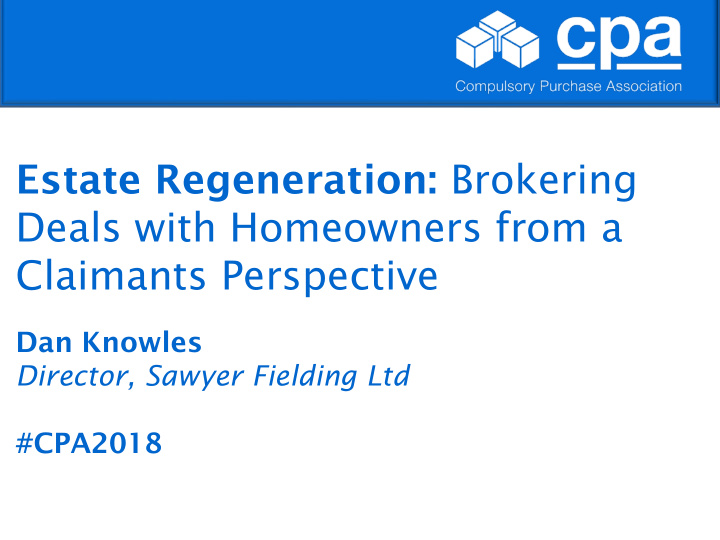



Estate Regeneration: Brokering Deals with Homeowners from a Claimants Perspective Dan Knowles Director, Sawyer Fielding Ltd #CPA2018
Estate Regeneration Brokering deals wit ith homeowners fr from a cla claimants perspective By Dan Knowles MRICS RICS Registered Valuer & Director Sawyer Fielding
In Introduction? Why is brokering important? • Increasing amount of estate regeneration schemes • Added focus on homeowners rights • A modern wave of housing activism • The Aylesbury CPO decision • The Foxhill (Bath) Planning Application JR • Mayor of London’s Good practice guide and ballots • Scheme delays This presentation will discuss practical suggestions on • Relocations • Negotiations • Budgeting
Shared equity provision Increasingly common way of meeting s226 requirements, though not the only way Is it a viable option for homeowners ? • Explaining what it is • Service charge levels. Subsidy? • Minimum percentage levels. Keeping some money back • Rights of succession • SDLT contribution • Increasing or reducing number of bedrooms • Off estate shared equity and the affordability gap • Leasehold swaps • Timing of availability of information
Fin inding somewhere to buy Individual circumstances, individual needs • Lack of understanding of the process • Affordability gap - demoralising • Most active estate agents • Lists of what is GENUINELY still available • Role of the Surveyor / ITLA • Arranging viewings, searching on Portals
Negotiating with Resident owners (1 (1) What is their motivation? • Comparing offers within the community / exaggerations and make them different • Comparable evidence • ‘Like for like’ • Overly commercial approach – when is the worst time to use it? • Consultation and engagement, even when their valuation is carried out • Disturbance compensation lump sum or evidenced • Reacting if scared or worried • Deafening silence – it will be filled
Negotiating wit ith Landlords What is their motivation? • Capital Growth v High yield (valuation 101) and investment advice • Lack of motivation to sell and to find elsewhere • Costs for evictions and working with specialists • Sharing the risk for void periods • CGT and availability of rollover relief • Accidental and Portfolio Landlords
The problem wit ith budgeting (1) It is difficult to allocate budget until there is certainty that an Order has been confirmed BUT “The confirming authority will expect the acquiring authority to demonstrate that they have taken reasonable steps to acquire all of the land and rights included in the Order by agreement” (Tier 1, Section 2 of Guidance on Compulsory purchase process and The Crichel Down Rules (the Circular) We’d rather buy as close to the block VP date as possible and don’t want to deal with empty properties BUT We will struggle to find somewhere to buy so need as much time as possible to find somewhere suitable and time to find elsewhere if that falls through (homeowners) We want homeowners to act logically in assessing the value of their homes BUT I won’t agree the value of my home until I find somewhere to buy I like within my budget (which may not be possible)
The proble lem wit ith budgetin ing (2) The aim: To provide a degree of certainty to acquiring authority and to the homeowner, whilst mitigating risks • Index linking agreements – Joshua & John cases • Option agreements with at least £5,000, possibly then deducted from final settlement • Longstop date • Call in notice to alter long stop • Selling window • Lock in notice • Put notice • Lock in notice invalidated if reasonable endeavours not evidenced Helps to remove link between what do I need to buy what I want? And how much am I willing to sell for? Encourages rational decision making in negotiations
Thank you for lis listening www.sawyerfielding.co.uk @sawyer_fielding Dan Knowles MRICS, RICS Registered Valuer and Director
Recommend
More recommend